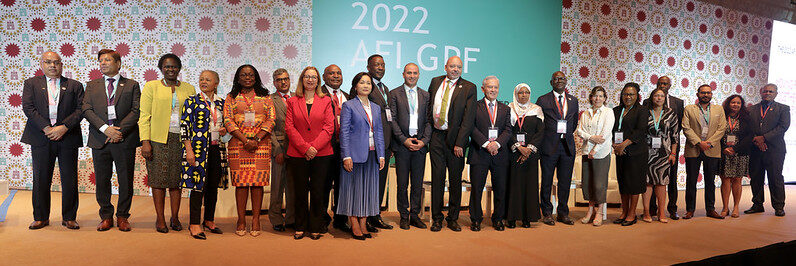AFI member institutions have set new financial inclusion goals by updating its three accords on inclusive fintech, gender and green finance, making even more ambitious targets during the 7th Annual General Meeting (AGM), held at the Dead Sea, Jordan on 6 September, 2022.
AFI welcomed its newest member, the Jordan Payments and Clearing Company (JoPACC), a domestic payment system operator owned and managed by the Central Bank of Jordan (CBJ) and the other banks, which joins the network as an Associate Member. AFI members acknowledged the Central Bank of Eswatini which upgraded its membership from Associate to Principal from this year.
“Gender gap and gender issues have been there for too long, as are climate change impacts and hardships faced by forcibly displaced (FDPs). In these three specific examples of global challenges, the network can claim and document progress”, AFI Executive Director Dr. Alfred Hannig told members.
AFI Membership Council met ahead of the 2022 AFI Global Policy Forum, on 6 September, 2022 at the Dead Sea in Jordan to review the progress and work of the network for the past year, update the three Accords to reflect the realities and evolving landscapes in all three policy area and to assess organization’s strategic priorities.
“With the fast changes the world is experiencing, the work and the mandate of the central banks are also expanding and the updated accords reflect this change”, Dr. Hannig added as he addressed the membership.
Offering a more substantial in-country implementation dimension, the updated Sharm El-Sheikh Accord on Inclusive Green Finance (IGF) introduces a broader concept of green finance, including environment degradation and more precise approach to mitigation and adaptation. The Sharm Accord offers tangible links between the role of financial regulators and the broader global and national green finance and financial inclusion landscapes.
By updating the Denarau Action Plan (DAP) on gender inclusive finance, AFI members introduced a more ambitious, bolder and intentional focus on sustainable usage of quality financial services and not just their access. The DAP aims to increase institutional diversity, women’s leadership and closing of the financial inclusion gender gap. Members also acknowledged six key progress milestones achieved in gender inclusive finance and revised the plan’s goals to encourage all AFI members to set national-level SMART targets. GIF is now considered a high priority policy area by 74 percent of the members compared to 58 percent in 2021.
Following the endorsement of the Sochi Accord on Inclusive FinTech, AFI members are now taking into account new and emerging topics in the FinTech landscape, such as Regulatory and Supervisory Technologies (RegTech and SupTech) for financial inclusion, central bank digital currencies, open finance and data ecosystems, among others. It puts greater emphasis on in-country implementation support, peer learning and developing-developed country dialogue (3D).
“AFI’s work is more essential than ever if we want to continue to broaden the impact of our network”, said Dr. Jesús De La Fuente Rodríguez, AFI Board Chair and President of the Comisión Nacional Bancaria y de Valores (CNBV), Mexico.
Underlining that the AGM empowers organization’s sustainability and determination to foster financial inclusion, AFI Board Chair applauded members for simultaneously managing the impacts of the crisis while supporting the ongoing initiatives and identifying future opportunities for the network.
As part of appointments to the AFI’s Board of Directors and Committees, the Membership Council ratified the Reserve Bank of Fiji as the Vice-Chair of AFI’s Board for the ongoing term from September 2021 to September 2023. AFI members also ratified Principal Member institutions to serve on the Committees of the Board for the term commencing September 2022 until September 2024.
Earlier in the day, Deputy Governor of the Central Bank of Jordan Ziad Ghanma addressed the membership council and welcomed participants to Jordan ahead of the AFI Global Policy Forum taking place on 7 – 8 September 2022.
AFI regional impact
Besides Gender Inclusive Finance, Green Inclusive Finance and Inclusive FinTech, the policy areas championed by AFI also include digital financial services (DFS), consumer empowerment and market conduct, national financial inclusion strategies (NFIS), and small and medium size enterprise (SME) finance.
When it comes to account ownership, South Asia and East and South East Asia are regions that made most progress, but it Sub-Saharan Africa, followed by Latin America and the Caribbean and Eastern Europe and Central Asia that made more progress in financial inclusion. Philippines, Thailand and Malaysia have made great strides the region. This is excluding India and China due to the size of their population.
By enabling a practical revolution in their financial systems and integrating key financial services that are available for the majority of its citizens, Sub-Saharan Africa has been a vital catalyser of financial inclusion. Efforts and examples of Nigeria, South Africa, Kenya, and Tanzania, among many others in the region, enabled the proper environment by investing in their financial infrastructure.
In Latin America, countries with large populations such as Mexico, Argentina and Peru spearheaded financial inclusion, in addition to Ecuador and Costa Rica
In the Arab Region, Jordan has cut its gender gap in access to finance by over a half, while Egypt is one of the network’s leaders in inclusive green finance, along with Morocco.

